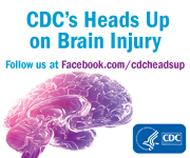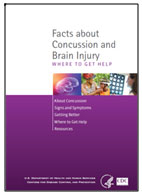Concussion
Where Can I Find Support and Additional Resources?
Getting Support: Information for People with Concussion
There are many people who can help you and your family as you recover from a concussion. You do not have to do it alone.
Talk with your health care professional or provider about your concerns. Ask your health care professional about whether you need specialized treatment and about the availability of rehabilitation programs.
Your health care professional can help you find a provider who has special training in treating concussion. Early treatment of symptoms by a specialist may speed recovery. Your health care professional may refer you to a neuropsychologist, neurologist, or specialist in rehabilitation.

Share your stories with other brain injury survivors, their family members and caregivers. Become a Partner for better Prevention, Recognition and Response to TBI.
Keep talking with your health care professional, family members, and loved ones about how you are feeling, both physically and emotionally. If you do not think you are getting better, tell your health care professional.
Getting Support: Information for Caregivers
When someone close to you has a concussion or a more serious brain injury, it can be hard to know how best to help. They may say that they are “fine,” but you can tell from how they are acting that something has changed.
If you notice that your family member or friend has symptoms of a concussion that are getting worse, talk to them and their health care professional about getting help. They may need help if you can answer YES to any of the following questions:
- Are any of the concussion symptoms substantially affecting their life activities (such as feeling restricted in their activities due to symptoms, performance in school or at work has changed, unhappy with life changes)?
- Has their personality changed?
- Do they get angry for no reason?
- Do they get lost or easily confused?
- Do they have more trouble than usual making decisions?
Who Can I Contact for Support?
Several groups help people and their families deal with concussion and more serious brain injuries. They provide information and put people in touch with local resources, such as support groups, rehabilitation services, and a variety of health care professionals.
The Brain Injury Association of America(BIAA) has a national network of many state affiliates and hundreds of local chapters and support groups across the country that provide help in your community. You can reach BIAA by calling the toll-free National Brain Injury Information Center at 1-800-444-6443. You can also get information through BIAA’s website. Both the help line and the website can provide you with information about the BIAA affiliate closest to you.
The Defense and Veterans Brain Injury Center (DVBIC) works to ensure that active duty military and veterans with brain injury receive the best evaluation, treatment, and follow-up. You can reach DVBIC by calling toll-free at 1-800-870-9244 or by visiting DVBIC’s website.
Learn more information about TBI in the military, including an interactive website for service members, veterans, and families and caregivers.
Check out the Defense Center of Excellence webpages for more TBI resources for health care professionals.
Additional CDC Concussion Resources
Facts about Concussion and Brain Injury: Where to Get Help
 The “Facts about Concussion and Brain Injury: Where to Get Help,” brochure and fact sheet provides information for people with brain injuries and their family members or caregivers on concussion symptoms and danger signs, tips for healing, and information on where to get help after a concussion.
The “Facts about Concussion and Brain Injury: Where to Get Help,” brochure and fact sheet provides information for people with brain injuries and their family members or caregivers on concussion symptoms and danger signs, tips for healing, and information on where to get help after a concussion.
To order bulk quantities of CDC’s concussion resources free-of-charge and/or to learn how you can get involved to help keep all people safe from concussion, visit www.cdc.gov/Concussion or contact CDC by email (CDC-INFO@cdc.gov) or toll-free at 1-800-CDC-INFO (1-800-232-4636).
Heads Up: Brain Injury in Your Practice initiative
Physicians and other providers can play a key role in helping to reduce the occurrence of mild traumatic brain injury (TBI) or concussion by educating patients and the community about risks and how to prevent these injuries. This initiative provides physicians with tools and information for improving the clinical diagnosis and management of mild TBI.
Heads Up: Concussion in High School Sports initiative
Concussions can happen to any athlete—male or female—in any sport. This initiative, developed for high school coaches, athletic directors and trainers, contains practical, easy-to-use information, such as a video, guide for coaches, wallet card, clipboard sticker, posters, and fact sheets.
Heads Up: Concussion in Youth Sports initiative
To help ensure the health and safety of young athletes, CDC developed the “Heads Up: Concussion in Youth Sports” initiative to offer information about concussions to youth sports coaches, administrators, parents, and athletes. This initiative provides information about preventing, recognizing, and responding to a concussion and includes fact sheets for coaches, athletes, and parents, and a clipboard, magnet, poster, and quiz.
Heads Up: Prevent Shaken Baby Syndrome (SBS)
SBS is a leading cause of child abuse deaths in the United States . This initiative provides public health information and resources to prevent SBS. As part of this initiative, CDC developed a Guide for Health Departments and Community Based Organizations and a Journalists Guide to Shaken Baby Syndrome which includes broadcast-quality video that includes b-roll, full-screen tips, and downloadable scenarios.
Help Seniors Live Better, Longer: Prevent Brain Injury initiative
This initiative was developed for caregivers and children of older adults to raise their awareness of ways to prevent, recognize, and respond to fall-related TBI among adults ages 75 and older. As part of this initiative, CDC developed English- and Spanish-language materials for older adults and their caregivers, including a brochure, booklet, fact sheet, magnet, posters, and e-cards.
Contact Us:
- Centers for Disease Control and Prevention
National Center for Injury Prevention and Control (NCIPC)
4770 Buford Hwy, NE
MS F-63
Atlanta, GA 30341-3717 - 800-CDC-INFO
(800-232-4636)
TTY: (888) 232-6348
New Hours of Operation:
8am-8pm ET/
Monday-Friday
Closed Holidays - cdcinfo@cdc.gov



